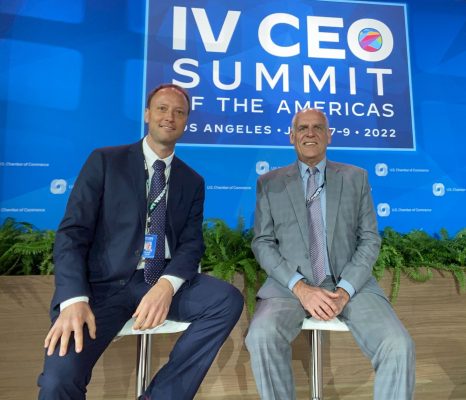The Summit of the Americas held June 6-10 should spur new dialogue between governments and businesses in the hemisphere on various challenges

Many Latin American leaders at the Ninth Summit of the Americas face a stark reality: how to address increasing challenges to democracy in the region. Economic and security issues amid COVID are forcing waves of workers and families to leave their home countries. And concerns about the quality and reliability of key institutions, such as rule of law and freedom of information, are among the many other issues expressed by growing numbers of disenchanted citizens in numerous Latin American countries. A top message coming through loud and clear: democracies that fail to deliver fundamental freedoms and economic prosperity are doomed to fall apart.
One concept that has guided CIPE and private sector partners around the world for the past 40 years is that small and medium-sized local businesses and entrepreneurs are a tremendous source of economic dynamism and democratic legitimacy.
This includes the self-employed, a vast number of them “informal” or unregistered workers, and women-owned businesses. A disfranchised entrepreneur is also a disfranchised citizen. Indeed, the disenfranchisement of Latin American citizens has become more painfully evident throughout the pandemic, as the region has suffered both the world’s worst economic contraction and the highest death rate. Economies and health systems failed after too many years of policies unmoored from the needs of citizens.
The vision of CIPE and partners closely aligns with the Summit’s theme of “Building a Sustainable, Resilient, and Equitable Future.” Our dozens of ongoing and newly launched projects across Latin America are aimed at laying the foundations for a more prosperous region where democratic freedoms drive policymaking, from improving economic growth to safeguarding civil liberties. From Argentina to Mexico, CIPE is working with private sector and civil society organizations to strengthen democracy and communities by developing digital eco-systems, fighting corruption, highlighting accountable investment practices, reducing barriers to trade, and empowering women entrepreneurs and youth. Other efforts include identifying opportunities and ways to leverage new technologies in a variety of sectors. The ultimate goal is to create inclusive economic opportunity within a robust democratic framework throughout the region.
Ahead of the Summit, CIPE convened thought leaders from all corners of the region to find key public policy solutions to common challenges. For example, CIPE’s Colombia office hosted a major conference in Bogotá, where 15 experts from eight Latin American countries joined over 20 Colombian experts to discuss the “Future of Work” in the region, addressing everything from data-driven decision making to better use of tech in facilitating employment registration, tax payments, and administration for judicial systems. The conference underscored the urgency of training the region’s labor force in tandem with technology updates and changes to legal frameworks. Another key topic among attendees: developing a digital economy.
Many experts describe this time as a “once-in-a-generation” chance for employers, workers, and government institutions to create new economic opportunities.
To help societies meet this moment, CIPE is also drawing on its global experience and vast network of partners in developing digital tools to assist both the public and private sectors, including chambers of commerce in Colombia’s post conflict areas, women entrepreneurs in Central America, and Ecuadorean private businesses. For example, CIPE and partners continue to address the causes of irregular migration from Central America and Mexico by providing community-based opportunities for economic growth and civic participation. Meanwhile, CIPE’s regional entrepreneurship projects for women, youth, and creative sector entrepreneurs, such as Soy Colmena Creativa and the Corali confront the region’s low citizen engagement, economic stagnation, and declining trust in democratic institutions underpinning irregular migration. By creating conditions for economic growth and increased democratic engagement, CIPE’s entrepreneurship programs help address the root causes driving individuals to migrate.
Our regional partners are also shedding light on how “corrosive capital” foreign investment, much of it from authoritarian countries and with secret conditions, is contributing to the democratic backsliding underway in the region and even loss of sovereignty. At the same time, they are highlighting ways that communities can position themselves to receive more beneficial “constructive capital” that supports democracy. CIPE’s new Center for Accountable Investment and its well-established Anti-Corruption and Governance Center can be two key resources for all stakeholders.
In the coming weeks, CIPE will release the results of a survey of eight Latin American countries assessing the private sector’s role in defending democratic institutions. The survey asked private businesses across the region about their capacity to engage in collective action to defend democracy within the Inter-American system. We hope the survey findings will foster a conversation about the private sector’s role in strengthening Latin American democracies.
Dialogues and progress on the topics outlined above will be crucial to the success of the Summit of the Americas, as leaders seek to unite the Western Hemisphere, reaffirm shared values, and strengthen economic relationships. At CIPE, we are working to reverse the tide of democratic decay in the region and spur a new democratic wave that can lift all boats on the back of democratic governance and private entrepreneurship. We look forward to working with all of our partners to build democratic institutions that deliver on their promise of a more prosperous life for all citizens.
Published Date: June 09, 2022